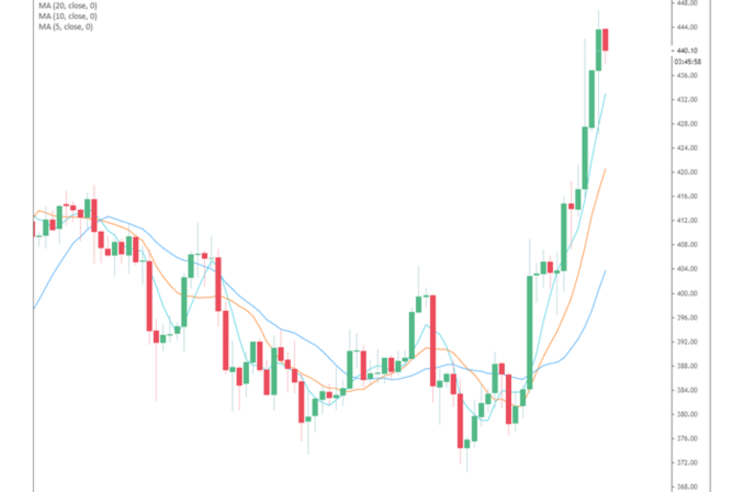The price of Bitcoin (BTC) is nearing $16,000 after achieving $15,960 on Binance. Following the dominant cryptocurrency’s rally, analysts are now looking toward Ether (ETH). The Ethereum blockchain’s native token has seen heightened momentum in the past week. After underperforming against BTC in October, the probability of a new ETH rally is beginning to increase.
There are two key reasons why analysts expect Ether to perform strongly in the near term. First, the capital in the Bitcoin market could move into ETH following the announcement of Ethereum 2.0. Second, ETH recently tested a critical resistance level, raising the chances of a broader rally. Given that the altcoin market has historically rallied after an initial Bitcoin upsurge, the timing of an ETH uptrend is ideal.

Capital to move from Bitcoin into Ether?
Since Oct. 21, the price of Bitcoin has increased by around 33%. It broke out of important resistance areas, one after another, starting with $13,000. When Bitcoin initially surpassed $13,000, large whale clusters formed at that level. It showed that whales began to actively accumulate BTC, causing $13,000 to evolve into a support zone.
After BTC reclaimed $13,000 as a support level for the first time since July 2019, it continued to surge upward. Over time, it confirmed $13,500 as the next support level, followed by $14,000 and, most recently, $15,000. When Bitcoin started climbing upward, analysts said it was negative for altcoins, as it began to suck most of the volume from the crypto market. Consequently, as Bitcoin rallied, many altcoins declined in value against both Bitcoin and the U.S. dollar.
The overwhelming strength of Bitcoin from October to early November took a hard toll on the altcoin market, but Bitcoin’s price action has shown that the bullish market sentiment around crypto has returned. As such, a clean breakout above $15,000 could trigger more capital to diverge into higher-risk plays, which include Ether.
Denis Vinokourov, head of research at crypto exchange and broker Bequant, told Cointelegraph that capital from Bitcoin could cycle into Ether and the Ethereum ecosystem. In the last 48 hours, the decentralized finance market has performed particularly strong after stagnating since early September.
DeFi tokens, such as Yearn.finance’s YFI and Uniswap’s UNI surged by almost 30% after Ether’s abrupt recovery. Hence, Vinokourov emphasized that the broader Ethereum ecosystem could soon benefit from Bitcoin’s rally:
“All eyes may be on Bitcoin and the surge past the $15,000 level. However, the recent development update related to Ethereum may result in some capital rotating back into Ethereum and its broader ecosystem. This isn’t to say that Bitcoin will be actively sold, but the trend in locking Bitcoin on the Ethereum network may accelerate and be put to work across oversold DeFi and DEX tokens such as Uniswap.”
Atop the historical tendency of Ether to soar following a Bitcoin rally, crypto traders have said that ETH could soon rise against Bitcoin. Michaël van de Poppe, a full-time trader at the Amsterdam Stock Exchange, said the ETH/BTC trading pair has hit a major support area. Van de Poppe stated, “It took ages, but $ETH reached the 0.026 area we’ve been discussing a lot,” referring to it as a big support zone for ETH.

Ethereum 2.0 release playing its part
The release of Ethereum 2.0 in the imminent future is critical for the momentum of Ether, as the network upgrade would significantly increase the transaction capacity of ETH. This would allow the new DeFi cycle, if it emerges, to last for a long period because it would reduce the risk of network clogs and high transaction fees. Since Ethereum 2.0 supports staking, allowing users to allocate 32 ETH to the network in return for incentives, it could decrease the circulating supply of ETH across exchanges.
According to Ethereum co-founder Vitalik Buterin’s blog post titled “Why Proof of Stake,” staking on Ethereum will reward users with a 15% return. Because the rate of return is based on ETH holdings and not the U.S. dollar, if the price of ETH continues to increase, then the staking incentives increase with it. As such, analysts expect more investors to accumulate ETH to stake it, which would decrease the sell-side pressure on it.
The market and the community have anticipated Ethereum 2.0 for several years, but challenges have delayed its release. Ethereum 2.0 has required several testnets with an immense amount of testing due to the complexity of the upgrade. Developers behind Ethereum 2.0 wrote on the Medalla testnet’s Github page:
“Before such a mainnet can be launched, we need testnets that mimic mainnet conditions as good as possible. This requires us to have stable, long-term, and persistent testnets up and running that are supported by not only one client but multiple clients, ideally, all clients.”
The sentiment around Ether has become increasingly bullish because the launch of Ethereum 2.0 coincides with various favorable catalysts for ETH. A pseudonymous cryptocurrency trader known as “Loma” pinpointed the fact that Ethereum 2.0 will remove about $1 billion from the market. While supply drops, the rally of Bitcoin is bringing significant capital back into the cryptocurrency as the ETH/BTC trading pair is forming a bottom formation.
The excitement around Ethereum 2.0 has intensified after Buterin’s personal wallet sent 3,200 ETH to an Ethereum 2.0 deposit address. According to the official Ethereum 2.0 release notes by coordinator Danny Ryan, if there are 16,384 deposits of 32 ETH seven days prior to Dec. 1, the Ethereum 2.0 upgrade can commence. After years of research, testing and implementation, there is finally a hard date for the release.
The confluence of Ethereum 2.0 nearing, which would benefit the entire Ethereum and DeFi ecosystem in terms of scaling, and the strength of the ETH/BTC trading pair makes a rally in November and December more likely. There is also the narrative that ETH surged significantly in January 2018 to its all-time high of $1,419, almost a month after BTC reached its record-high at $20,000.



Comments (No)